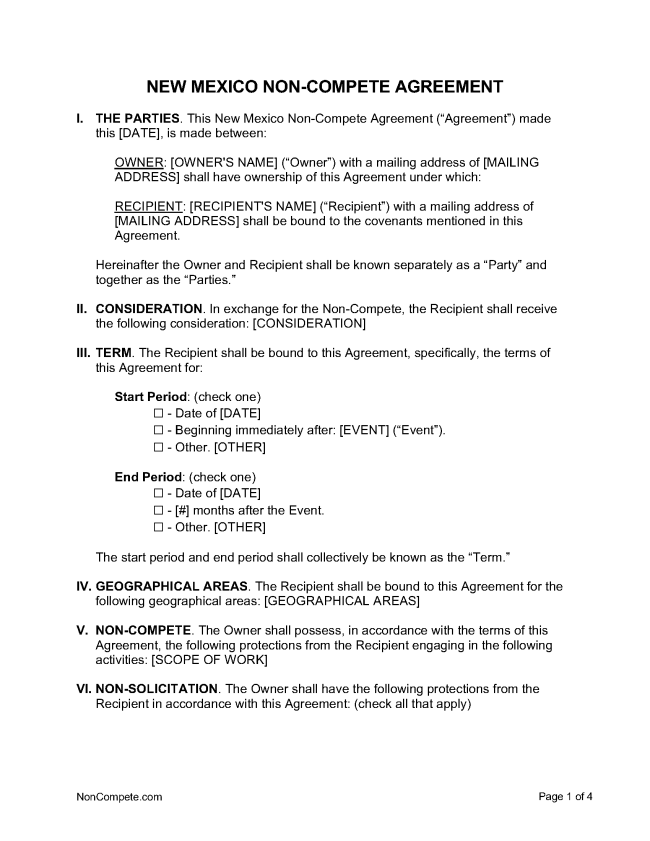A New Mexico non-compete agreement is a contractual provision that limits an employee or business operator from pursuing a particular line of work. New Mexico is relatively lenient with non-compete agreements, generally enforcing them if they are reasonable. However, the state has specific restrictions, such as significant limitations on non-competes in the healthcare industry.
Table of Contents |
Are Non-Competes Enforceable in New Mexico?
Yes, if they are reasonable, and
- They are not against public policy; and
- The detriment to the public interest by limiting the restrained party is outweighed by the public benefit of enforcing the contract.
KidsKare, P.C. v. Mann (2015).
Legitimate Business Interest
Interests that may be protected with non-compete agreements include:
- Trade Secrets, as defined in New Mexico’s Trade Secrets Act (Rapid Temps, Inc. v. Lamon (2008)); and
- The good will of patients, customers, or clients toward a business (Lovelace Clinic v. Murphy (1966))
Sale of Business vs. Employment Contract
Courts scrutinize non-compete agreements arising out of employment contracts more closely than those related to the sale of a business. (Bowen v. Carlsbad Ins. & Real Est., Inc. (1986)).
Public Interest
The public policies courts consider in non-compete agreements include ensuring that competition is not unreasonably limited or restricted. For example, in KidsKare, P.C. v. Mann (2015), the Court of Appeals of New Mexico held that enforcing a non-compete agreement against a doctor would not violate the state’s public policy because underserved patients would still be able to get an appointment quickly.
Non-Solicitation
A non-solicitation clause in a non-compete agreement may mean that the restricted party is prohibited only from actively trying to lure away clients of the former employer, or it may be prohibited from both active solicitation and passively accepting those clients. (Manuel Lujan Ins., Inc. v. Jordan (1983)).
Hence, agreements should be written clearly to make clear what the parties intend. If the agreement is ambiguous, a court will try to determine the parties’ intent.
Prohibited Professions
Attorneys cannot enter non-compete agreements contained in employment contracts or partnership agreements (Rule 16-506(a), New Mexico Rules of Professional Conduct) or in settlements of cases (Rule 16-506(b), New Mexico Rules of Professional Conduct).
Post-employment non-compete agreements involving healthcare practitioners are generally unenforceable. (N.M. Stat. Ann. § 24-1I-2). Limited agreements that prevent a healthcare practitioner who has worked for an employer for less than three years may be enforceable to recover the employer’s expenses associated with:
- Loans
- Relocation expenses
- Recruiting, education, and training
- Signing bonuses intended to bring providers to a particular geographic area
And agreements requiring healthcare practitioners to pay a fixed fee called liquidated damages if they work for a competitor are enforceable. (N.M. Stat. Ann. § 24-1I-4).
Additionally, non-competes are enforceable when they are contained in agreements between the shareholders or owners of a healthcare practice. (N.M. Stat. Ann. § 24-1I-5).
Terminating an Employee
If an employee is terminated without good cause, a non-compete agreement is not enforceable against the employee. (Danzer v. Professional Insurors, Inc. (1984)).
The party seeking to enforce a non-compete has the burden of proof, and ambiguities in the contract will be interpreted in favor of the employee. (Manuel Lujan Ins., Inc. v. Jordan (1983)).
Continued Employment (consideration)
It is unclear if continued employment is adequate consideration to support a non-compete agreement in New Mexico. In Taylor v. Lovelace Clinic (1967), the Supreme Court of New Mexico held there was sufficient consideration for a non-compete agreement when there were benefits and detriments to both parties. However, the case involved an employee beginning a new job, not continuing in one already held.
Maximum Term
There is no maximum term for a non-compete agreement because courts evaluate the circumstances of each agreement.
In selling stock in an insurance company, the New Mexico Supreme Court upheld a 15-year non-compete agreement as reasonable. (Bowen v. Carlsbad Ins. & Real Est., Inc. (1986).
Shorter agreements, lasting one or two years, have been upheld in agreements ancillary to an employment contract. (Manuel Lujan Ins., Inc. v. Jordan (1983)).
Blue Penciling (allowed)
A court will reform or modify an unreasonable portion of a non-compete agreement to make the contract enforceable only if there is evidence from the agreement that the parties wanted a court to act that way, such as by including language in the agreement that clauses can be removed if necessary. (KidsKare, P.C. v. Mann (2015)).
